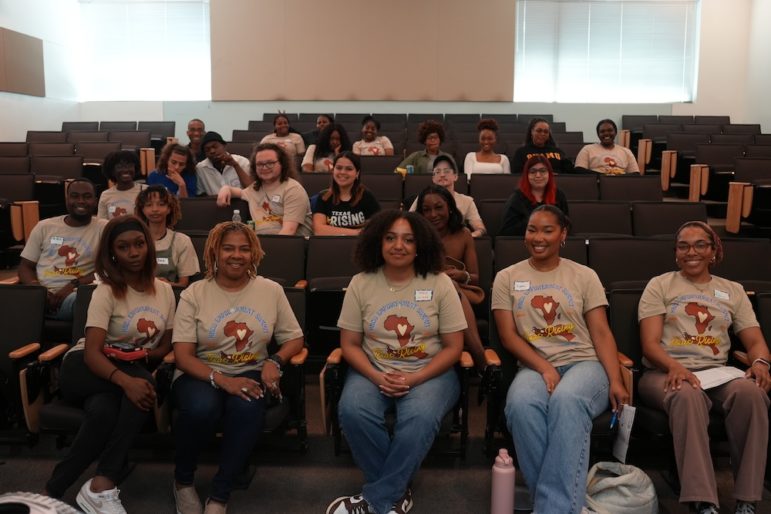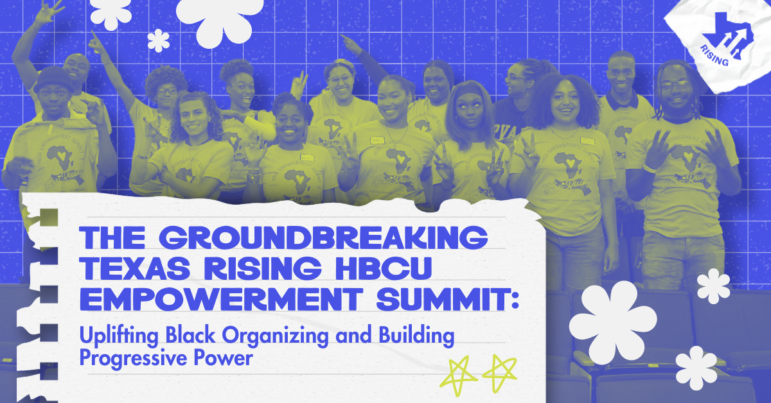The Texas Rising HBCU Empowerment Summit was held to uplift Black organizing, build progressive power, and create community.
Building progressive power requires creating connections and community, especially in a state like Texas, where state leaders have long focused on dividing and silencing us.
Texas Rising, a program of Texas Freedom Network, was built to create these vital connections among young Texans of color as we mobilize our communities for social justice.
Texas Rising’s core values guide us to advocate for reproductive justice, voting rights, criminal justice reform, immigration justice, and LGBTQIA+ equality — but at the core of these issues lies a fundamental commitment to racial justice.
We must center racial justice in our push for collective liberation because the very foundation of our country is rooted in racism and exploitation of Black and Brown communities. Every attack on our freedoms today, from reproductive justice to voting access, is rooted in racist attempts to ensure that white, patriarchal leaders remain in power.
Yet, even in the face of our country’s oppressive past and present, Black and Brown organizers have driven every inch of social progress made in this country. From the Civil Rights Movement to the creation of reproductive justice frameworks, we have seen what people power can win.
For over a century, Historically Black Colleges and Universities (HBCUs) have nurtured activism and countless grassroots movements. So it was fitting that the inaugural Texas Rising HBCU Empowerment Summit was held this April at Texas Southern University, one of the top ten largest HBCUs in America.
The event provided an inclusive platform for young Black Texans to build connections, enhance organizing skills, and generate positive change within the Black community in Texas and beyond.
We sat down with Gracie Israel, Texas Rising Regional Program Coordinator for North Houston, College Station, and Prairie View, to chat about creating intentional space to focus on Black organizing tenets, highlights from the day, the American Dream (or lack thereof), Texas Rising, and so much more.

What inspired you to work at Texas Rising and in community organizing?
I worked as a certified nursing assistant in a nursing home in high school, and while that might not seem like community organizing, it was the start for me.
I volunteered, caring for the residents, hospice care, daily living activities, and much more. Through that, I developed a profound empathy rooted in intimate daily interactions and holistic care for individuals facing vulnerability. This unique compassion extended beyond simple empathy, fostering a deep understanding of the diverse needs and challenges within my community.
At the nursing home, I saw how important it is to have a support system in your life. That experience taught me how to use my resources to help my community in whatever way I can. While initially pursuing a nursing degree at the University of Houston, I soon discovered my true calling lies in psychology and mental wellness. I strongly believe in the interconnectedness of community cohesion and mental well-being, recognizing their profound impact on each other.
My first real organizing position was with Texas Rising doing voter registration as a deputy field organizer in 2022.
Through Texas Rising, I did a lot of networking and learned how to connect us with different organizations for events to reach more students.
What was your overall goal in hosting the Texas Rising HBCU Empowerment Summit?
I’d never heard of a similar event happening, and I saw the need for collective organizing with young Black folks during my time in the field from 2022 to the present day. I spoke with people from all walks of life and what really stood out to me is the need for our Black Community to come together and actively show up for each other, not just talk about it.
I used to work in the South Houston region for Texas Rising first as a deputy field organizer, then got promoted as an advocacy field organizer, and Texas Southern University is in that region. Now, I’m the regional program coordinator for the North Houston region, and I work with Prairie View A&M.
I got promoted to regional program coordinator in February 2024, and one of my top priorities was to host a Black empowerment event.
My entire time at Texas Rising, we’ve talked about getting the nearby HBCUs together to collaborate on an event. Now, that I have the capacity as a full-time staff member at Texas Rising, I was able to make it happen!
Our goal throughout the entire process was to bring the Black community together and empower us to get involved in civic engagement.
Why is it important to create intentional spaces where Black organizers can connect and strategize?
It’s important because the scars of segregation and Jim Crow laws remain fresh in historical memory. I believe the prison system acts as reformed slavery through disproportionately high incarceration rates among marginalized communities, serving as a form of social control and economic exploitation.
There’s power in numbers and power in people coming together with a shared goal and ideas. We wanted this event to be put on for Black communities by Black communities. Hence, our speakers and main stakeholders were all Black.
People think they understand someone else’s experiences but can’t truly understand until they’ve been through it. Genuine understanding only comes from firsthand experience and lived realities.
Black organizers need to come together to empower each other. The process of liberation begins with the consciousness of oppression.
Why is it vital that racial justice is at the core of our movement’s goals?
At Texas Rising, we focus on criminal justice reform, immigration reform, reproductive rights, voting rights, LGBTQIA+ rights, and climate justice. I wanted to create opportunities for us to focus specifically on racial justice so we can make sure we’re using our power and resources to uplift racial justice in every single issue we work on.
Certain politicians might try to whitewash our history, but the truth is that America was built by generations of Black people forced into slavery. Then, the so-called “American Dream” tells us that if we work hard, we can become successful. As if it’s that simple.
For Black people, we already have a disadvantage. We have economic disparities, the housing crisis, the school-to-prison pipeline, and so many other hurdles in our way.
I always say “Every person is my people.” I saw a quote once that said, “You have never looked in the face of someone that God does not love.”
Yes, I’m part of the Black community, but all people are still my people. For instance, I do a lot of immigration work. My family and I are not immigrants so ICE doesn’t directly affect me, however, people from undocumented communities are still my people.
Completely ignoring racial injustice makes [every attack on our rights] worse, and that’s part of the problem.
How does creating community and hosting events like the HBCU Empowerment Summit center racial justice and tie racial justice to our core issues?
When your community is being advocated for by an organization, you’re going to have more passion to join them. It’s all about representation.
Can you tell me what it felt like to be at the event and give me some highlights of your favorite moments?
Our first two speakers talked about the origins of HBCUs and collective organizing, and those topics inspired folks and got them thinking about how to organize and why we organize. I loved learning more from the people at the event.
My favorite part, though, was the discussions that happened during the event. For the discussion at the end, we had 15 questions prepared, but we only got through 3 because everyone had so many in-depth opinions.
The questions that we got to were:
“What recent advancements and setbacks have happened for Black advocacy efforts both locally and nationally?” In response, we talked about Jim Crow laws and how they had literacy tests for voting back then. It was illegal for people who had been enslaved to know how to read, so even after the abolishment of slavery, we didn’t have voting access.
“Are there any forms of reformed slavery today, and what are some examples?” Prison. I mean, of course, we talked about prison.
We also asked: “Is the American Dream actually real? What demographic does it exist for?” It is not a reality for all Americans and it is based on white privilege.
How do you find joy in this work?
I love being out in the field and hearing the community’s stories. A lot of people, the first conversation I have with them, they’ll spill so much about their lives and dreams. I find joy in creating that safe space for people to be vulnerable with me.
There’s a lot to learn from listening. I’ve never really learned much from speaking. I love hearing people’s stories and what got them here.
I also like planning fun events! They’re always tied to our work, but even having a movie night increases morale on the team. Creating that connection makes folks feel like, “I’m going to a beach cleanup with my friend,” instead of just going to work. Building the bonds in the chapter is so important. We’re mobilizing and doing the work together.
Want to join Texas Rising’s fight to build progressive power, uplift the tenants of Black organizing, and create the Texas we deserve? Learn more at txrising.org today!


